Stichodactyla gigantea
Stichodactyla gigantea, commonly known as the giant carpet anemone,[2] is a species of sea anemone that lives in the Indo-Pacific area. It can be kept in an aquarium but is a very challenging species to keep alive and healthy for more than 3–5 years.
| Stichodactyla gigantea | |
|---|---|
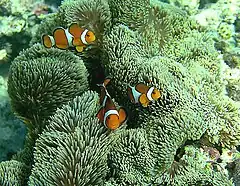 | |
| Stichodactlya gigantea with false percula clownfish, Amphiprion ocellaris | |
| Scientific classification | |
| Domain: | Eukaryota |
| Kingdom: | Animalia |
| Phylum: | Cnidaria |
| Class: | Hexacorallia |
| Order: | Actiniaria |
| Family: | Stichodactylidae |
| Genus: | Stichodactyla |
| Species: | S. gigantea |
| Binomial name | |
| Stichodactyla gigantea | |
| Synonyms | |
|
List
| |
Description
Stichodactyla gigantea has a diameter that is usually no larger than 50 centimetres (1.6 ft) and a maximum of 80 centimetres (2.6 ft).[3] It can appear in a number of colors, commonly brown or greenish and rarely a striking purple or pink, deep blue, or bright green.[4] A healthy S. gigantea will possess tentacles that are extremely sticky to the touch, with firm adherence to surfaces.[4]
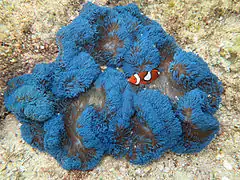 Blue
Blue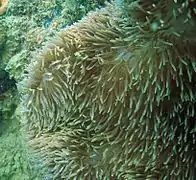 Beige
Beige Green
Green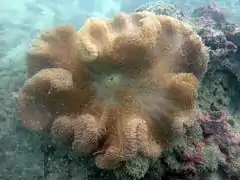 Orange
Orange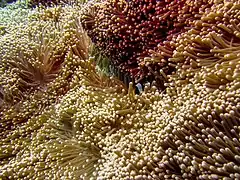 Tan
Tan
Ecology
S. gigantea resides on shallow seagrass beds or sand flats around 8 centimetres (3.1 in) deep (at low tide).[5] Most anemones are treated as sessile, but the ones inhabited by anemonefish are in fact motile.[4] Zooxanthellae are obligate symbionts within the anemone.
S. gigantea hosts 7 different species of anemonefish
- Amphiprion akindynos (Barrier reef anemonefish)
- A. bicinctus (Two-band anemonefish)
- A. clarkii (Clark's anemonefish)
- A. ocellaris (False clownfish)
- A. percula (Clownfish)
- A. perideraion (Pink skunk anemonefish)
- A. rubrocinctus (Australian anemonefish)
Juvenile Dascyllus trimaculatus also associate with S. gigantea.[4]
Aquarium trade
S. gigantea is uncommon in the aquarium trade.[6] Though smaller in size than other carpet anemone species, it is significantly more delicate, and requires a large, mature reef aquarium. Like all sea anemones in captivity that have a symbiotic, mutualistic relationship with anemonefish, S. gigantea requires intense aquarium lighting, impeccable water quality, and stable parameters.[6] It is prone to shipping stress and bacterial infections during transit.[6] Due to these factors, many hobbyists advocate quarantining this anemone and treating with antibiotics such as Ciprofloxacin or Septra for a minimum of one week before acclimating it to the main tank.[7]
References
- Fautin, D. (2010). "Stichodactlya gigantea (Forsskål, 1775)". WoRMS. World Register of Marine Species. Retrieved 2011-12-23.
- Fenner, Robert M. (1998). The Conscientious Marine Aquarist: A Commonsense Handbook for Successful Saltwater Hobbyists. Shelburne, VT: Microcosm Ltd.
- "Freshmarine.com: Carpet anemone". Retrieved 2 October 2013.
- Fautin, Daphne G.; Allen, Gerald R. (1997). Field Guide to Anemone Fishes and Their Host Sea Anemones. Western Australian Museum. ISBN 9780730983651. Archived from the original on 14 April 2015.
- Mitchell, Jeremy S. (2003). "Mobility of Stichodactlya gigantea sea anemones and implications for resident false clown anemonefish, Amphiprion ocellaris". Environmental Biology of Fishes. 66: 85–90. doi:10.1023/a:1023286009054.
- Animal-World References: Marine and Reef, 2015. http://animal-world.com/Aquarium-Coral-Reefs/Giant-Carpet-Anemone Giant Carpet Anemone.
- Protocol for using antibiotics to treat infected anemones. (2014). http://www.reefcentral.com/forums/showthread.php?t=2271385
External links
- "Stichodactyla gigantea". Integrated Taxonomic Information System. Retrieved 2011-12-23.
- Stichodactyla gigantea. Klunzinger, 1877. Retrieved through: World Register of Marine Species.
- Hexacorallians of the World